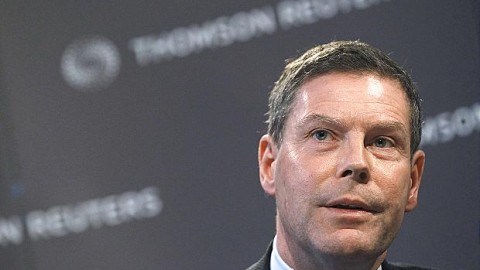By Carla Main
Mary Jo White, U.S. President Barack Obama’s choice to run the Securities and Exchange Commission, may be compelled to provide more information about her ties to large banks as senators press her today about how she would operate as Wall Street’s regulator.

reputational compliance
Some Democrats on the Senate Banking Committee who will question White at a nomination hearing say their concerns probably don’t threaten her confirmation. White, 65, has said she would retire from New York-based Debevoise & Plimpton LLP, where she has served as a lawyer defending Wall Street, if she’s confirmed by the Senate.
White, who was the Manhattan-based U.S Attorney from 1993 to 2002, has had numerous meetings with senators in recent weeks as she faces skepticism about her ties to Wall Street. In her prepared Senate testimony, released yesterday, White doesn’t address the issue. She previously pledged to abstain for one year from any SEC matter that involves Debevoise or its clients.
Senator Sherrod Brown, an Ohio Democrat, said last week he wasn’t ready to support White for the post. He expressed concerns about conflicts of interest to a law firm “that have not been cut.”
White has said Debevoise would pay her a lump-sum retirement payment within 60 days of her starting at the SEC. The payment would replace her monthly retirement payments for four years. She is eligible for lifetime monthly payments from Debevoise of about $42,500, according to her financial disclosure statement.
Other Democrats, including Senator Mark Warner of Virginia, said in interviews that they are inclined to support White.
Her testimony dwells on market regulation, a topic that hasn’t been a large part of her career as a litigator. She singled out high-frequency and algorithmic trading as strategies that demand further evaluation from the SEC.
“There must be a sense of urgency to addressing these issues to understand their impact on investors and the quality of our markets so that the appropriate regulatory responses can be made,” White wrote.
White said her first priority would be completing rules required by the Dodd-Frank Act of 2010 and last year’s Jumpstart Our Business Startups Act. The SEC should consistently consider the economic costs and benefits of new rules “from the outset,” she wrote.
White said that many other pending regulations await her at the SEC, including a rule to place new restrictions on money- market mutual funds and one that would set a new standard for brokers’ conduct with customers. She also singled out high- frequency and algorithmic trading as strategies that demand further evaluation from the SEC.
White has spent much of her 38-year legal career at Debevoise, where she earned $2.4 million last year and represented banks. She could be pressed to explain how she’d oversee the SEC’s enforcement program, said Mark Calabria, director of financial regulation studies at the Cato Institute and a former Republican staff member of the Banking Committee.
“Investors and all market participants need to know that the playing field of our markets is level and that all wrongdoers — individual and institutions, of whatever position or size — will be aggressively and successfully pursued by the SEC,” White wrote in her testimony.
Senate Republicans haven’t publicly expressed reservations about White’s nomination. Her history as an attorney for banks could make her more appealing to some Republican senators because it suggests she understands how regulations affect companies, according to Richard C. Breeden, a Republican and former SEC chairman from 1989 to 1993.
Compliance Policy
Cordray Nomination at Stalemate as Senators Refuse to Negotiate
A U.S. Senate hearing today on Richard Cordray’s second nomination to head the Consumer Financial Protection Bureau will probably be less about his leadership than Republican distaste for the bureau itself.
Cordray faces a pledge by 43 Republican senators — enough to prevent a floor vote — to block his confirmation unless Democrats agree to structural changes to the bureau, created by the 2010 Dodd-Frank Act. Their position hardened after a federal court ruling raised questions about the validity of President Barack Obama’s 2012 recess appointment of Cordray to direct the bureau after Republicans blocked his first nomination.
The parties are refusing to negotiate as they await further court rulings.
The structural changes demanded by Republicans include putting the bureau under the control of a bipartisan commission and subjecting its budget to the congressional appropriations process. The agency’s budget is now linked to the Federal Reserve.
Cordray, 53, made no mention of the court challenge or Republican’s structural change demands in testimony prepared for today’s hearing.
Cordray can be confirmed by a majority vote, but to call the vote on the Senate floor, Democrats need 60 members’ support. With 55 members in the Senate’s Democratic caucus, five Republicans would have to break ranks to allow a vote.
For more, click here.
SHFE Calls for Opening Commodities Futures to Overseas Traders
China should accelerate opening commodities futures to overseas investors and detail regulations allowing domestic firms to trade raw materials contracts on bourses abroad, Shanghai Futures Exchange Chairman Yang Maijun said in proposals to the National People’s Congress.
Government agencies including foreign exchange regulators and the tax bureau should use preparations already under way for crude oil futures trading to prepare similar policies allowing foreign investors to trade base metals, precious metals and natural rubber futures, Yang said, according to an e-mail from the exchange yesterday.
China introduced a Qualified Foreign Institutional Investor program in 2002, allocating quotas to non-Chinese funds that were initially restricted to trading stocks and bonds listed on exchanges. In July 2012, China allowed entry into the interbank market, which hosts 99 percent of the nation’s debt.
The SHFE is facing rising competition from the Hong Kong Exchanges & Clearing Ltd.
Chinese companies are disadvantaged because they don’t have legitimate channels to access overseas commodities futures markets to hedge, yesterday’s statement cited Yang as saying.
Too-Big-to-Fail Subsidy Claim Data Flaws Faulted by Bank Groups
Lobby groups for the largest U.S. banks pushed back against claims that they remain too big to fail, rebutting assertions by lawmakers and regulators that they enjoy a “taxpayer subsidy” because of their size.
The Dodd-Frank Act, passed by Congress in response to the 2008 credit crisis, greatly diminished whatever advantage the biggest lenders held over smaller rivals, five industry groups wrote yesterday in a brief on the issue. Senator Elizabeth Warren, a Massachusetts Democrat, used outdated information when she raised the matter at a hearing last month, the groups said.
“There is substantial evidence that the market recognizes the impact Dodd-Frank has had on investor expectations,” the Clearing House, Financial Services Forum, Financial Services Roundtable, Securities Industry and Financial Markets Association and American Bankers Association said in their brief. “Given the sizable costs associated with new regulations, together with the new orderly liquidation framework, any purported TBTF-related funding advantage has clearly been reduced or even eliminated.”
Senator Sherrod Brown, an Ohio Democrat, is planning to reintroduce legislation that would cap bank size. Brown and Senator David Vitter, a Louisiana Republican, are also preparing a bill that would increase capital requirements above the international Basel III standards.
For more, click here.
FDIC Rule May Limit CLO Spread Narrowing, Morgan Stanley Says
A new rule governing high-risk loans may change how banks insured by the Federal Deposit Insurance Corp. invest in collateralized loan obligations as they assess the cost of holding assets calculated in their ability to withstand stress, according to Morgan Stanley. (MS)
The regulation requires CLOs, which buy and package speculative-grade credit into securities of varying risk and return, to be treated as “higher-risk” assets, Morgan Stanley said yesterday in a report.
The designation may also include the least-risky portion of CLOs, rated AAA, under the FDIC regulation set to take effect on April 1 for U.S. banks with $10 billion of assets or more, the New York-based lender said. The rule may limit the narrowing of spreads in the top-rated portion of CLOs as banks consider investing in lower-rated slices of the loan funds, according to the note.
A total $17.8 billion of new CLOs have been raised this year, according to Morgan Stanley.
Danish Conservatives Rule Out More Regulation for Biggest Banks
Denmark’s Conservative Party will oppose adding to solvency and capital requirements for the country’s biggest lenders, Brian Mikkelsen, the party’s former business minister, said March 11 in a phone interview.
He said the party won’t support regulation exceeding European capital requirements, as “it will only serve to cut growth” in the economy.
The party supported all Danish banking regulation acts since the first Danish bank rescue bill in 2008.
Separately, writedowns at Danish banks are expected to decline in 2013 if the economy grows as projected, and to remain “substantial,” Berlingske reported, citing Kristian Vie Madsen, FSA deputy director.
China’s Wenzhou Plans 48% Private Lending Rate Cap, News Reports
Wenzhou, the eastern Chinese city hit hardest by the collapse of private lending last year, is planning a 48 percent limit on annual financing charges for private loans, according to the Shanghai Securities News.
Loans with maturities of more than one month will be considered usury if total annual charges, including interest and fees, exceed 48 percent, the newspaper reported yesterday, citing Li Youxing, a law professor from Zhejiang University who helped draft the rules. The city would also ban officials from government and financial institutions from participating in for- profit private financing, Li said, according to the newspaper.
In Wenzhou, an export hub where almost 90 percent of families have taken part in underground lending, more than 100 people have fled, committed suicide or declared bankruptcy from August 2011 through last May, and at least 800 lending brokers went bankrupt, according to the official Xinhua News Agency.
Wenzhou’s draft rules for private lending still need the approval of the local legislature of Zhejiang province, according to the Shanghai Securities News.
Two phone calls to the Wenzhou government seeking comment went unanswered yesterday.
Compliance Action
U.S. Freezes Assets of North Korea’s Top Foreign Exchange Bank
The U.S. Treasury Department froze the U.S. assets of North Korea’s Foreign Trade Bank, saying it facilitates transactions linked to the proliferation of weapons of mass destruction.
The company, which is North Korea’s primary foreign exchange bank, “facilitated millions of dollars in transactions” which benefited the country’s premier arms dealer Korea Mining Development Corp., the Treasury Department said yesterday in a statement.
Illinois Agrees to Settle SEC Charges Over Pension Disclosures
Illinois agreed to settle with the U.S. Securities and Exchange Commission over charges it misled investors about a growing shortfall in its employee pension funds as it sold $2.2 billion in bonds to investors.
From 2005 to 2009, Illinois failed to disclose how much it was underfunding its pension plans, the SEC said yesterday in an administrative action. The state didn’t adequately disclose cuts in its annual contributions to the fund, the agency said.
The SEC has been seeking to crack down on faulty disclosure by state and local governments that borrow in the $3.7 trillion municipal-bond market. It settled a similar case with New Jersey in 2010, the first time the regulator targeted a state.
The state neither admitted nor denied findings in the SEC’s order and cooperated with the agency, according to a statement from Governor Pat Quinn’s Office of Management and Budget.
Oppenheimer Reaches $2.9 Million SEC Accord on Fund Holdings
Oppenheimer & Co. (OPY) agreed to pay about $2.9 million to settle claims by the U.S. Securities and Exchange Commission that it misled investors in a private-equity fund.
The portfolio manager of the Oppenheimer fund valued its largest investment at a “significant markup” to an estimated value, the SEC said in a statement yesterday. The company also reached a settlement with Massachusetts Attorney General Martha Coakley for about $132,000.
Two Massachusetts pension plans sued Oppenheimer over investments in the fund. That lawsuit was dismissed by a federal judge in Boston.
Oppenheimer will pay $2.3 million to investors, including about $350,000 total to the pension funds that sued, according to the SEC and Coakley’s office.
A spokesman for New York-based Oppenheimer didn’t immediately respond to a phone message seeking comment on the settlement.
Ranieri Partners Settles SEC Case Over Unregistered Broker
Ranieri Partners, the private-equity firm founded by mortgage-bond pioneer Lewis S. Ranieri, will pay $375,000 to settle U.S. regulatory claims it improperly solicited more than $500 million from investors.
William Stephens was paid fees by Ranieri for soliciting investors even though he wasn’t registered as a broker, the Securities and Exchange Commission said in a statement yesterday. Stephens agreed to be barred from the securities industry and Donald Phillips, a former senior managing director who oversaw his work for Ranieri, will pay $75,000.
Stephens, Phillips and the firm settled the claims without admitting or denying the allegations. Phone calls to attorneys for Ranieri Partners and Phillips weren’t immediately returned. A call to an Illinois number listed for Stephens wasn’t answered.
Phillips was also suspended from acting in a supervisory capacity at an advisory firm or brokerage for nine months, according to the order.
Courts
Three Men Charged by U.K. With Running $60 Million Ponzi Fraud
Three men were charged with conspiracy to defraud investors through a “Ponzi-style” scheme that took in about 40 million pounds ($59.6 million), the U.K.’s Serious Fraud Office said.
Jolan Saunders, 36, Michael Strubel, 51, and Spencer Steinberg, 43, appeared at City of London Magistrates Court yesterday.
The charges relate to alleged fraud at Saunders Electrical Wholesalers Ltd., which told investors it had contracts to supply hotel chains and the athletes’ village for the London Olympic Games, the SFO said. Saunders was also charged with acting as a company director while disqualified.
Adrian Ring, a lawyer for Saunders, had no immediate comment when reached by telephone.
Ex-Futures Trader Guilty of Making $1 Million on Inside Tips
A self-employed London trader was sentenced to four years in prison after being convicted of making 692,644 pounds ($1 million) spread-betting with inside tips he received about forthcoming mergers.
Richard Joseph was found guilty on all counts by a jury in London yesterday and sentenced to four years in prison, said Chris Hamilton, a spokesman for the Financial Services Authority. Joseph was accused of trading on information he received from Ersin Mustafa, who worked in the print room at JPMorgan Chase & Co. (JPM)’s Cazenove unit.
Joseph made payments of more than 268,000 pounds to Mustafa, who also passed on tips from his brother, Ali, who worked in the print room at UBS AG (UBSN), prosecutors said.
Joseph’s case was related to the FSA’s Operation Saturn, which led to the arrests of eight men at the height of the financial crisis in 2008 as the regulator was under fire for failing to do enough to combat market abuse. Six people, including Ali Mustafa, were found guilty at a separate trial last year. Ersin Mustafa fled the U.K. in December 2009 and the regulator believes he is in Northern Cyprus.
Joseph, who worked for himself since the summer of 2000, testified during the trial that he was self-taught. He stopped trading in 2007, by which time he had 3.5 million pounds in the bank, he said.
For more, click here.
Interviews
Exchange Mergers May Concentrate Risk, Australia’s Medcraft Says
Mergers between exchange companies around the world may increase risks for investors as fewer companies handle derivatives trading and clearing, said the head of Australia’s securities regulator.
“It’s a logical conclusion, that if everything’s going through two clearinghouses there’s a concentration of risk,” Greg Medcraft, 56, chairman of the Australian Securities and Investments Commission, said in an interview yesterday. “You have to be careful about the unintended consequences of innovation.”
Global regulators are requiring more transactions to be processed through clearinghouses after the U.S. financial crisis triggered a $182 billion bailout of American International Group Inc. (AIG) when the insurer couldn’t make good on its trades. Exchanges have been the subject of $50 billion in attempted deals in the past three years.
Medcraft did not specifically identify any mergers.
Clearing in most Asia-Pacific countries with the exception of Japan is conducted by the dominant exchange operator. Hong Kong and Singapore are in the process of drafting rules for the clearing of over-the-counter derivatives.
Comings and Goings
Putin Aide Said to Be First Woman on Central Bank Shortlist
Elvira Nabiullina, a Kremlin aide and former economy minister, is being considered by President Vladimir Putin to replace Russian central bank Chairman Sergey Ignatiev, according to two people with knowledge of the matter.
Nabiullina, 49, joins a short list, the people said, asking not to be identified because the names haven’t been made public. Putin by law must name a candidate to replace Ignatiev, 65, three months before the central bank head’s third and final term ends June 24.
This article was written by Carla Main and originally published on bloomberg








